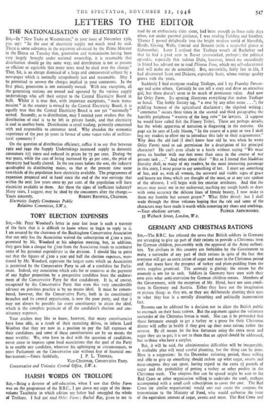HARSH WORDS ON TROLLOPE SIR,—Being a devotee of self-education, when
I saw that Orley Farm was on the programme of the B.B.C., I got down my copy of the three- volume Tauchnitz in which edition my father had smuggled the whole of Trollope. I had not read Orley Farm ; Rachel Ray, given to me to read by an enthusiastic elder sister, had been enough in those early days when, not under parental guidance, I was reading Fielding and Smollett. Thence I passed delightedly into the bright modern world of Meredith, Hardy, Gissing, Wells, Conrad and Bennett (with a respectful glance at Galsworthy). Later I realised that Trollope wasn't all Rachelray and that he had a good vein in Barset (overworked, perhaps); the political episodes, especially that tedious Duke, however, bored me exceedingly (a friend has advised me to read Phineas Finn, which my self-educational zeal will make me do sometime). But, meanwhile, fairly late in life, I had discovered Scott and Dickens, especially Scott, whose vintage quality grows with the years.
Suddenly I find everyone reading Trollope, and I try Framley Parson- age and some others. Certainly he can tell a story and draw an attractive girl, but there doesn't seem to be much of permanent value. And now for Orley Farm. Its opening illustrates everything that makes Trollope so banal. The feeble literary tag, " a rose by any other name . . ."; the piddling humour of the agricultural disclaimer ; the slipshod writing ; " commerce " occurs three times in the second and third paragraphs; the horrible periphrase " wearers of the long robe" for lawyers. (I suppose he would have called fish the Finney Tribe). These are perhaps details; but the whole apparatus of narration is disgusting in the extreme. On page six he says of Lady Mason, " In the course of a page or two I shall beg my readers to allow me to introduce this lady to their acquaintance." Why does the old fool (I don't know how old he was when he wrote Orley Farm) need to ask permission for a description of his principal character? He can't even allude to a heath without saying " We must press its heather with our feet more than once in the course of our present task . .." And what about this? " But as I intend that Madeline Staveley shall, to many of my readers, be the most interesting personage in this story, I must pause to say something of hcr. I must say something of her, and as, with all women, the outward and visible signs of grace and beauty are those which are thought of the most, or at any rate spoken of the oftenest, I will begin with her exterior attributes. And that the muses may assist me in my endeavour, teaching my rough hands to draw with some accuracy the delicate lines of female beauty, I now make to them my humble but earnest prayer." What filthy drivel: but I shall wade through the three volumes hoping that the tale and some of the characters may have made it worth while removing my shoes and stockings.
—Your obedient servant, PATRICK ABERCROMBIE. 33 Welbeck Street, London, W.r.


































 Previous page
Previous page